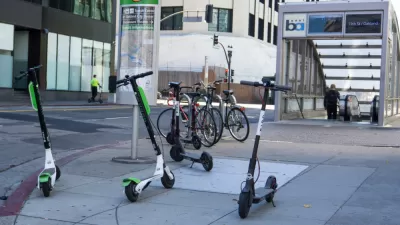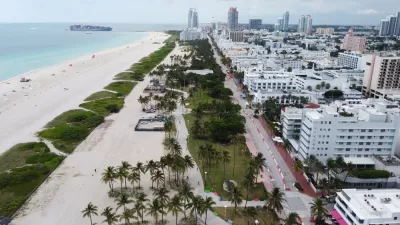As cities continue to adapt micromobility regulations to address new devices and technologies, what can we learn from Chicago's five years of e-scooter pilots?

Five years after shared e-scooter fleets first hit U.S. streets, Brandon Bordenkircher and Riley O'Neil assess the successes and challenges of scooter pilot programs around the country, particularly in Chicago. Speaking with city mobility leaders, the authors evaluate how the scooter companies fulfilled—or didn't—their early promises to cities.
Bordenkircher and O'Neil find that while many cities at first reacted by banning scooters, the devices have now become an important tool in improving mobility and providing options for underserved communities, but operators and cities have fallen short on safety and sustainability goals.
In Chicago, the city required that 50 percent of scooters would be placed in "equity zones," mandating coverage in low-income neighborhoods. However, equity advocates say increasing ridership also requires "community-led micromobility models such as neighborhood-based mobility hubs, non profit operators, and other innovative strategies that prioritize racial equity and mobility justice over profit."
When it comes to clutter and mobility, Chicago—which boasts some of the country's most robust bike parking infrastructure—requires scooter users to lock devices to a bike rack or other object, preventing the sidewalk clutter and inconvenience to pedestrians experienced in other cities.
While e-scooter fatalities remain rare, injuries are on the rise, and mobility advocates call on cities to improve infrastructure that would limit scooter-car interaction and reduce the chance of crashes. Meanwhile, despite claims that scooters provide a more environmentally friendly mobility option that can connect people to transit, the materials required to build the devices and the energy used in moving and collecting them, as well as the fact that many scooter trips could have been made by bike, on foot, or via public transit, mean that scooters do not make a meaningful impact on overall carbon emissions and resource use.
The article concludes that although the e-scooter industry has come a long way from its early days, more efforts are required to improve safety, equity, and sustainability and meaningfully integrate the devices into cities' transportation systems.
FULL STORY: Mobility leaders assess 5 years of e-scooters, and draw insights from the Chicago pilots

Planetizen Federal Action Tracker
A weekly monitor of how Trump’s orders and actions are impacting planners and planning in America.

Congressman Proposes Bill to Rename DC Metro “Trump Train”
The Make Autorail Great Again Act would withhold federal funding to the system until the Washington Metropolitan Area Transit Authority (WMATA), rebrands as the Washington Metropolitan Authority for Greater Access (WMAGA).

DARTSpace Platform Streamlines Dallas TOD Application Process
The Dallas transit agency hopes a shorter permitting timeline will boost transit-oriented development around rail stations.

Renters Now Outnumber Homeowners in Over 200 US Suburbs
High housing costs in city centers and the new-found flexibility offered by remote work are pushing more renters to suburban areas.

The Tiny, Adorable $7,000 Car Turning Japan Onto EVs
The single seat Mibot charges from a regular plug as quickly as an iPad, and is about half the price of an average EV.

Supreme Court Ruling in Pipeline Case Guts Federal Environmental Law
The decision limits the scope of a federal law that mandates extensive environmental impact reviews of energy, infrastructure, and transportation projects.
Urban Design for Planners 1: Software Tools
This six-course series explores essential urban design concepts using open source software and equips planners with the tools they need to participate fully in the urban design process.
Planning for Universal Design
Learn the tools for implementing Universal Design in planning regulations.
Municipality of Princeton
Roanoke Valley-Alleghany Regional Commission
City of Mt Shasta
City of Camden Redevelopment Agency
City of Astoria
Transportation Research & Education Center (TREC) at Portland State University
US High Speed Rail Association
City of Camden Redevelopment Agency
Municipality of Princeton (NJ)





























